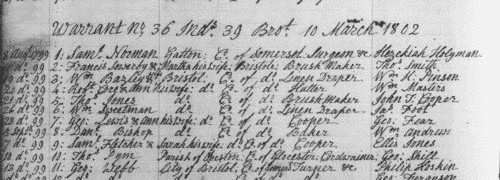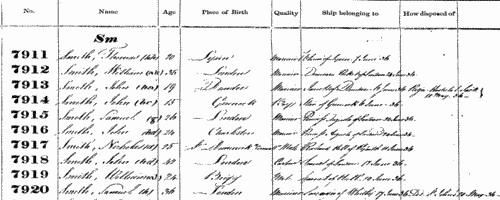Root Surname Ancestry ResultsOur indexes 1000-1999 include entries for the spelling 'root'. In the period you have requested, we have the following 139 records (displaying 61 to 70): Single Surname Subscription | | | Buying all 139 results of this search individually would cost £852.00. But you can have free access to all 139 records for a year, to view, to save and print, for £100. Save £752.00. More... |
These sample scans are from the original record. You will get scans of the full pages or articles where the surname you searched for has been found. Your web browser may prevent the sample windows from opening; in this case please change your browser settings to allow pop-up windows from this site.  Apprentices registered in Lincolnshire
(1803) Apprentices registered in Lincolnshire
(1803)
Apprenticeship indentures and clerks' articles were subject to a 6d or 12d per pound stamp duty: the registers of the payments usually give the master's trade, address, and occupation, and the apprentice's name, as well as details of the date and length of the apprenticeship. There are central registers for collections of the stamp duty in London, as well as returns from collectors in the provinces. These collectors generally received duty just from their own county, but sometimes from further afield. The indentures themselves can date from a year or two earlier than this return. (The sample entry shown on this scan is taken from a Bristol return. Each entry has two scans, the other being the facing page with the details of the indenture, length of service, and payment of duty.) IR 1/70ROOT. Cost: £8.00.  | Sample scan, click to enlarge

| Essex Freeholders: Hinckford hundred
(1810)
The poll of the freeholders of Essex at the election of a knight of the shire to serve in Parliament, taken at Chelmsford 31 January 1810 and fourteen following days (Sundays excepted). The candidates were John Archer Houblon esquire and Montagu Burgoyne esquire. This poll book gives the names of the voters arranged by initial letter of surname division by division. The freeholders' full names are stated, surname first, residence (often elsewhere), and place where the freehold lay. The right hand column records their votes. The qualification for suffrage in the counties was the possession of a freehold estate worth more than 40s a year. The electoral divisions comprised these hundreds: I. Barstable and Chafford; II. Becontree and Waltham; III. Chelmsford; IV. Hinckford; V. Tendring; VI. Uttleford, Clavering and Dunmow; VII. Harlow, Ongar and Freshwell; VIII. Lexden, Colchester and Witham; IX. Rochford and Thurstable; X. Dengie and Winstree. Hinckford hundred includes Braintree and Halstead.
ROOT. Cost: £6.00.  | Sample scan, click to enlarge

| Maldon Poll: Voters Resident in Maldon and the country
(1826)
On 7 June 1826 and the fourteen following days (Sundays excepted) a poll was held to elect Members of Parliament to represent the borough of Maldon in Essex. The candidates were the Hon. George Mark Arthur Way Allanson Winn (W) of Warley Lodge, who received 1747 votes; Thomas Barrett Lennard (L) esquire of Regent's Park, London, 1454 (or 1455) votes; and Quintin Dick (D) esquire of Curson Street, London, 1401. In all 3113 electors were polled, 2527 living in Maldon and the country, 586 in London and its environs. This poll book is divided into two sections, the 586 voters from London &c being listed separately. The names are listed alphabetically by surname, then christian name(s), occupation (in italics), address; and the right-hand column shows the votes cast. Those who did not vote are not listed.ROOT. Cost: £6.00.  | Sample scan, click to enlarge

|  British merchant seamen
(1835-1836) British merchant seamen
(1835-1836)
At this period, the foreign trade of ships plying to and from the British isles involved about 150,000 men on 15,000 ships; and the coasting trade about a quarter as many more. A large proportion of the seamen on these ships were British subjects, and so liable to be pressed for service in the Royal Navy; but there was no general register by which to identify them, so in 1835 parliament passed a Merchant Seamen's Registration Bill. Under this act this large register of British seamen was compiled, based on ships' crew lists gathered in British and Irish ports, and passed up to the registry in London. Each seaman was assigned a number, and the names were arranged in the register by first two letters of the surname (our sample scan shows one of the pages for 'Sm'); in addition, an attempt was made to separate out namesakes by giving the first instance of a name (a), the second (b), and so on. But no effective method was devised to prevent the same man being registered twice as he appeared in a second crew list; moreover, the original crew lists were clearly difficult for the registry clerks to copy, and some of the surname spellings appear to be corrupted. A parliamentary committee decided that the system devised did not answer the original problem, and this register was abandoned after less than two years: but it is an apparently comprehensive source for British merchant seamen in 1835 to 1836. The register records the number assigned to each man; his name; age; birthplace; quality (master, captain, mate, 2nd mate, mariner, seaman, fisherman, cook, carpenter, boy &c.); and the name and home port of his ship, with the date of the crew list (usually at the end of a voyage). Most of the men recorded were born in the British Isles, but not all (for instance, Charleston and Stockholm appear in the sample scan). The final column 'How disposed of' is rarely used, and indicates those instances where a man died, was discharged, or deserted his ship during the voyage.ROOT. Cost: £8.00.  | Sample scan, click to enlarge

| Bankrupts
(1839)
Bankruptcy notices for England and Wales: bankruptcy often caused people to restart their lives elsewhere, so these are an important source for lost links
ROOT. Cost: £6.00.  | Sample scan, click to enlarge

| Dividends of bankrupts' estates
(1839)
Dividends from moneys raised from bankrupts' estates in England and WalesROOT. Cost: £6.00.  | Sample scan, click to enlarge

| Insolvents
(1839)
Insolvency notices for England and Wales: insolvency often caused people to restart their lives elsewhere, so these are an important source for lost linksROOT. Cost: £6.00.  | Sample scan, click to enlarge

| Insolvents
(1839)
Declarations of insolvency in England and WalesROOT. Cost: £6.00.  | Sample scan, click to enlarge

| Insolvents
(1839)
Insolvency notices for England and Wales: insolvency often caused people to restart their lives elsewhere, so these are an important source for lost linksROOT. Cost: £6.00.  | Sample scan, click to enlarge

| Bankrupts
(1840)
Bankruptcy notices for England and Wales: bankruptcy often caused people to restart their lives elsewhere, so these are an important source for lost links
ROOT. Cost: £6.00.  | Sample scan, click to enlarge

|
Research your ancestry, family history, genealogy and one-name study by direct access to original records and archives indexed by surname.
|













